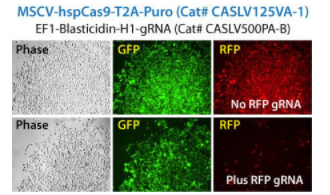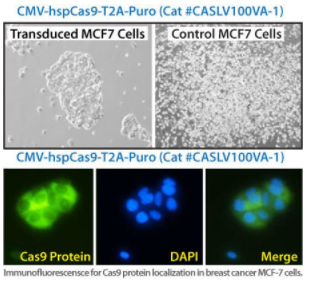System Biosciences
MSCV-hspCas9-T2A-Puro SmartNuclease Pre-Packaged Lentiviral Particles [>10^6 IFUs]
- SKU:
- CASLV120VA-1
- Availability:
- Usually Shipped in 5 Working Days
- Size:
- 2 x 25ul
- Shipping Temperature:
- Dry Ice
Description
MSCV-hspCas9-T2A-Puro SmartNuclease Pre-Packaged Lentiviral Particles [>10^6 IFUs]. Cat# CASLV120VA. Supplier: SBI System Biosciences


Overview
When you want to create stable Cas9 editing cell lines and/or would like to edit the genome of a cell line that is resistant to transfection by plasmids, turn to one of SBI’s Cas9 SmartNuclease Lentivector Systems. Available as lentivector plasmids, ready-to-transduce pre-packaged pseudovirus, and in a package-your-own-lentivector kit with the lentivector plasmid and the LentiStarter 3.0 Packaging Kit, the MSCV-hspCas9-T2A-Puro Two Vector Cas9 SmartNuclease™ Lentivector expresses human codon-optimized Cas9 wild-type nuclease from the strong MSCV promoter and includes the puromycin selectable marker.
All pseudoviral particle preparations have been packaged to exacting QC standards and come with functional titer and in-house transduction data for each production lot of virus.

- Conduct genome editing and engineering in difficult-to-transfect cell lines
- Drive Cas9 expression from the MSCV promoter, for high expression in hematopoietic and stem cells
- Perform in vivo engineering of model organisms
- Supports synthetic biology applications, gene- and cell-based therapy development, and genome-wide functional screening
Why an HR targeting vector is a recommended
Even though gene knock-outs can result from DSBs caused by Cas9 alone, SBI recommends the use of HR targeting vectors (also called HR donor vectors) for more efficient and precise mutation. HR donors can supply elements for positive or negative selection ensuring easier identification of successful mutation events. In addition, HR donors can include up to 6-8 kb of open reading frame for gene knock-ins or tagging, and, when small mutations are included in either 5’ or 3’ homology arms, can make specific, targeted gene edits.
Not sure whether you need a CRISPR/Cas9 plasmid, purified protein, or mRNA?
Use this table to choose the CRISPR/Cas9 product that’s right for you:


How It Works
Genome engineering with CRISPR/Cas9
For general guidance on using CRISPR/Cas9 technology for genome engineering, take a look at our CRISPR/Cas9 tutorials as well as the following application notes:
CRISPR/Cas9 Gene Knock-Out Application Note (PDF) »
CRISPR/Cas9 Gene Editing Application Note (PDF) »
CRISPR/Cas9 Gene Tagging Application Note (PDF) »
CRISPR/Cas9 Basics
Through careful selection of the target sequence and design of a donor plasmid for homologous
recombination, you can achieve efficient and highly targeted genomic modification with CRISPR/Cas9.
The system

Cas9 protein—uses guide RNA (gRNA) to direct site-specific, double-strand DNA cleavage adjacent to a protospacer adapter motif (PAM) in the target DNA.
gRNA—RNA sequence that guides Cas9 to cleave a homologous region in the target genome. Efficient cleavage only where the gRNA homology is adjacent to a PAM.
PAM—protospacer adapter motif, NGG, is a target DNA sequence that spCas9 will cut upstream from if directed to by the gRNA.
The workflow at-a-glance
DESIGN: Select gRNA and HR donor plasmids. Choice of gRNA site and design of donor
plasmid determines whether the homologous recombination event results in a knock-out,
knock-in, edit, or tagging.
CONSTRUCT: Clone gRNA into all-in-one Cas9 vector. Clone 5’ and 3’ homology arms into HR
donor plasmid. If creating a knock-in, clone desired gene into HR donor.
CO-TRANSFECT or CO-INJECT: Introduce Cas9, gRNA, and HR Donors into the target cells
using co-transfection for plasmids, co-transduction for lentivirus, or co-injection for mRNAs.
SELECT/SCREEN: Select or screen for mutants and verify.
VALIDATE: Genotype or sequence putative mutants to verify single or biallelic conversion.
Supporting Data
See Two Vector Cas9 SmartNuclease Lentivectors in action
MSCV-driven Cas9 and CMV-driven Two Vector Cas9 SmartNuclease Lentivectors efficiently deliver Cas9 to transduced cells for efficient genome editing.
Two-Vector Cas9-Lentiviruses efficiently knockout stable RFP reporter gene

Figure 1. Two Vector Cas9 Lentiviruses efficiently knockout stable RFP reporter gene. METHODS: Phase and fluorescent images of modified HEK293T cells stably expressing RFP and GFP (top panels), which have been co-infected (MOI = 3) with the MSCV-Cas9-T2A-Puro Two Vector Cas9 SmartNuclease Lentivector (Cat.# CASLV125VA-1) and a gRNA virus expressing a guide RNA targeting RFP (EF1α-Blasticidin-H1-RFP gRNA, Cat.# CASLV500PA-B; bottom panels). Images of cells were taken 11 days after placing the cells under selection, and show ablation of RFP expression in target cells infected with both the Cas9-expressing Lentivector and gRNA-expressing Lentivector (bottom panels).
Transduce Cancer Cell Lines with Cas9-Lentivirus

Figure 2. Transduce Cancer Cell Lines with Cas9-Lentivirus. METHODS: (Top panels) Phase microscopy image of MCF-7 breast cancer cells infected with pseudoviral particles of CMV-hspCas9-T2A-Puro (Cat #CASLV100VA-1) and selected with Puromycin (1 µg/ml) for 10 days in culture, show distinct colony formation. (Bottom panels) Immunofluorescence staining of Cas9 protein expression in MCF-7 cell lines stably transduced with the CMV-hspCas9-T2A-Puro Two Vector Cas9 SmartNuclease Lentivector (Cat #CASLV100VA-1), show punctuate nuclear and perinuclear staining indicative of strong Cas9 protein expression in the nucleus.

![MSCV-hspCas9-T2A-Puro SmartNuclease Pre-Packaged Lentiviral Particles [>10^6 IFUs] MSCV-hspCas9-T2A-Puro SmartNuclease Pre-Packaged Lentiviral Particles [>10^6 IFUs]](https://cdn11.bigcommerce.com/s-i3n9sxgjum/images/stencil/608x608/products/14066/14334/sbi%2520system%2520biosciences_1633075021__00205.original__92820.1633076780.jpg?c=1)
![MSCV-hspCas9-T2A-Puro SmartNuclease Pre-Packaged Lentiviral Particles [>10^6 IFUs] MSCV-hspCas9-T2A-Puro SmartNuclease Pre-Packaged Lentiviral Particles [>10^6 IFUs]](https://cdn11.bigcommerce.com/s-i3n9sxgjum/images/stencil/608x608/products/14066/14334/sbi%20system%20biosciences_1633075021__00205.original__92820.1633076780.jpg?c=1)
![CMV-hspCas9-T2A-Puro SmartNuclease Pre-Packaged Lentiviral Particles [>10^6 IFUs] CMV-hspCas9-T2A-Puro SmartNuclease Pre-Packaged Lentiviral Particles [>10^6 IFUs]](https://cdn11.bigcommerce.com/s-i3n9sxgjum/images/stencil/590x590/products/12543/12807/sbi%2520system%2520biosciences_1633075021__00205.original__08428.1633076543.jpg?c=1)
![CMV-hspCas9-T2A-Puro SmartNuclease Pre-Packaged Lentiviral Particles [>10^6 IFUs] CMV-hspCas9-T2A-Puro SmartNuclease Pre-Packaged Lentiviral Particles [>10^6 IFUs]](https://cdn11.bigcommerce.com/s-i3n9sxgjum/images/stencil/590x590/products/12543/15547/Screenshot_2021-12-06_224845__32511.1638812975.png?c=1)
![MSCV-hspCas9-EF1-GFP SmartNuclease Pre-Packaged Lentiviral Particles [>10^6 IFUs] MSCV-hspCas9-EF1-GFP SmartNuclease Pre-Packaged Lentiviral Particles [>10^6 IFUs]](https://cdn11.bigcommerce.com/s-i3n9sxgjum/images/stencil/590x590/products/14062/14330/sbi%2520system%2520biosciences_1633075021__00205.original__00980.1633076780.jpg?c=1)
![MSCV-hspCas9-EF1-GFP SmartNuclease Pre-Packaged Lentiviral Particles [>10^6 IFUs] MSCV-hspCas9-EF1-GFP SmartNuclease Pre-Packaged Lentiviral Particles [>10^6 IFUs]](https://cdn11.bigcommerce.com/s-i3n9sxgjum/images/stencil/590x590/products/14062/29396/Screenshot_2021-12-15_220630__50766.1639588152.png?c=1)
![CMV-hspCas9-T2A-Puro-H1-AAVS1 gRNA SmartNuclease Pre-Packaged Lentiviral Particles [>10^6 IFUs] CMV-hspCas9-T2A-Puro-H1-AAVS1 gRNA SmartNuclease Pre-Packaged Lentiviral Particles [>10^6 IFUs]](https://cdn11.bigcommerce.com/s-i3n9sxgjum/images/stencil/590x590/products/12545/12809/sbi%2520system%2520biosciences_1633075021__00205.original__77085.1633076544.jpg?c=1)
![CMV-hspCas9-T2A-Puro-H1-AAVS1 gRNA SmartNuclease Pre-Packaged Lentiviral Particles [>10^6 IFUs] CMV-hspCas9-T2A-Puro-H1-AAVS1 gRNA SmartNuclease Pre-Packaged Lentiviral Particles [>10^6 IFUs]](https://cdn11.bigcommerce.com/s-i3n9sxgjum/images/stencil/590x590/products/12545/15447/Screenshot_2021-12-05_191711__56791.1638713858.png?c=1)
![Cas9 Nickase: MSCV-hspCas9(D10A)-T2A-Puro SmartNickase Pre-Packaged Lentiviral Particles [>10^6 IFUs] Cas9 Nickase: MSCV-hspCas9(D10A)-T2A-Puro SmartNickase Pre-Packaged Lentiviral Particles [>10^6 IFUs]](https://cdn11.bigcommerce.com/s-i3n9sxgjum/images/stencil/590x590/products/12516/12780/sbi%2520system%2520biosciences_1633075021__00205.original__96364.1633076539.jpg?c=1)
![Cas9 Nickase: MSCV-hspCas9(D10A)-T2A-Puro SmartNickase Pre-Packaged Lentiviral Particles [>10^6 IFUs] Cas9 Nickase: MSCV-hspCas9(D10A)-T2A-Puro SmartNickase Pre-Packaged Lentiviral Particles [>10^6 IFUs]](https://cdn11.bigcommerce.com/s-i3n9sxgjum/images/stencil/590x590/products/12516/15553/CASLV225PA-1__70182.1638864794.png?c=1)
![CMV-hspCas9-EF1-GFP SmartNuclease Pre-Packaged Lentiviral Particles [>10^6 IFUs] CMV-hspCas9-EF1-GFP SmartNuclease Pre-Packaged Lentiviral Particles [>10^6 IFUs]](https://cdn11.bigcommerce.com/s-i3n9sxgjum/images/stencil/590x590/products/12539/12803/sbi%2520system%2520biosciences_1633075021__00205.original__41412.1633076543.jpg?c=1)
![CMV-hspCas9-EF1-GFP SmartNuclease Pre-Packaged Lentiviral Particles [>10^6 IFUs] CMV-hspCas9-EF1-GFP SmartNuclease Pre-Packaged Lentiviral Particles [>10^6 IFUs]](https://cdn11.bigcommerce.com/s-i3n9sxgjum/images/stencil/590x590/products/12539/15571/Screenshot_2021-12-07_223653__92966.1638898652.png?c=1)